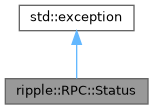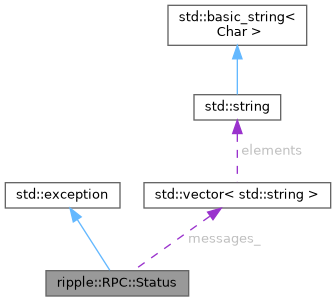Status represents the results of an operation that might fail. More...
#include <Status.h>


Public Types | |
| enum class | Type { none , TER , error_code_i } |
| using | Code = int |
| using | Strings = std::vector< std::string > |
Public Member Functions | |
| Status ()=default | |
| template<typename T , typename = std::enable_if_t<std::is_integral<T>::value>> | |
| Status (T code, Strings d={}) | |
| Status (TER ter, Strings d={}) | |
| Status (error_code_i e, Strings d={}) | |
| Status (error_code_i e, std::string const &s) | |
| std::string | codeString () const |
| operator bool () const | |
| Returns true if the Status is not OK. | |
| bool | operator! () const |
| Returns true if the Status is OK. | |
| TER | toTER () const |
| Returns the Status as a TER. | |
| error_code_i | toErrorCode () const |
| Returns the Status as an error_code_i. | |
| template<class Object > | |
| void | inject (Object &object) const |
| Apply the Status to a JsonObject. | |
| Strings const & | messages () const |
| std::string | message () const |
| Return the first message, if any. | |
| Type | type () const |
| std::string | toString () const |
| void | fillJson (Json::Value &) |
| Fill a Json::Value with an RPC 2.0 response. | |
| T | what (T... args) |
Static Public Attributes | |
| static constexpr Code | OK = 0 |
Private Attributes | |
| Type | type_ = Type::none |
| Code | code_ = OK |
| Strings | messages_ |
Detailed Description
Status represents the results of an operation that might fail.
It wraps the legacy codes TER and error_code_i, providing both a uniform interface and a way to attach additional information to existing status returns.
A Status can also be used to fill a Json::Value with a JSON-RPC 2.0 error response: see http://www.jsonrpc.org/specification#error_object
Member Typedef Documentation
◆ Code
| using ripple::RPC::Status::Code = int |
◆ Strings
Member Enumeration Documentation
◆ Type
|
strong |
Constructor & Destructor Documentation
◆ Status() [1/5]
|
default |
◆ Status() [2/5]
| ripple::RPC::Status::Status | ( | T | code, |
| Strings | d = {} |
||
| ) |
◆ Status() [3/5]
◆ Status() [4/5]
| ripple::RPC::Status::Status | ( | error_code_i | e, |
| Strings | d = {} |
||
| ) |
◆ Status() [5/5]
| ripple::RPC::Status::Status | ( | error_code_i | e, |
| std::string const & | s | ||
| ) |
Member Function Documentation
◆ codeString()
| std::string ripple::RPC::Status::codeString | ( | ) | const |
Definition at line 9 of file Status.cpp.
◆ operator bool()
| ripple::RPC::Status::operator bool | ( | ) | const |
◆ operator!()
| bool ripple::RPC::Status::operator! | ( | ) | const |
◆ toTER()
| TER ripple::RPC::Status::toTER | ( | ) | const |
◆ toErrorCode()
| error_code_i ripple::RPC::Status::toErrorCode | ( | ) | const |
Returns the Status as an error_code_i.
This may only be called if type() == Type::error_code_i.
◆ inject()
| void ripple::RPC::Status::inject | ( | Object & | object | ) | const |
◆ messages()
◆ message()
| std::string ripple::RPC::Status::message | ( | ) | const |
Return the first message, if any.
Definition at line 61 of file Status.cpp.
◆ type()
◆ toString()
| std::string ripple::RPC::Status::toString | ( | ) | const |
Definition at line 75 of file Status.cpp.
◆ fillJson()
| void ripple::RPC::Status::fillJson | ( | Json::Value & | value | ) |
Fill a Json::Value with an RPC 2.0 response.
If the Status is OK, fillJson has no effect. Not currently used.
Definition at line 42 of file Status.cpp.
Member Data Documentation
◆ OK
◆ type_
|
private |